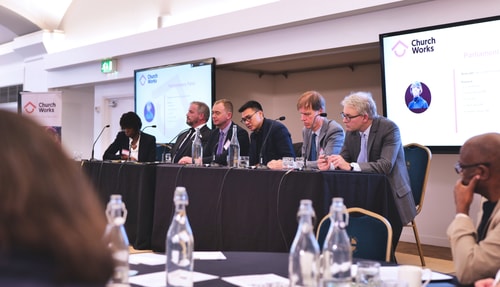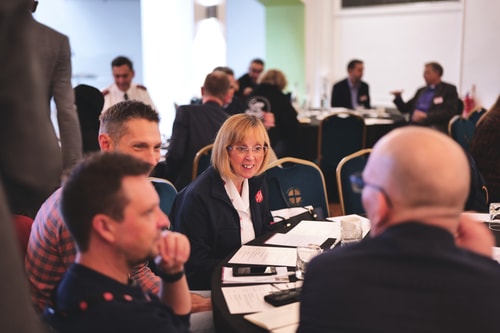This month, ChurchWorks held their first in-person summit, showcasing what the church is doing to address issues relating to wellbeing, family, and the cost of living crisis across the country; catalysing further partnership between church denominations together with government departments.
Those in attendance at the ChurchWorks summit heard from a range of panellists, who lead Christian-based charities operating in the areas of wellbeing, family and poverty. The discussion of how the church can work alongside policymakers was central to the day. There was an opening address from the government’s faith minister, Baroness Scott of Bybrook OBE, and the event closed with a parliamentary panel discussion chaired by the Evangelical Alliance’s head of public policy, Alicia Edmund.
The summit was the catalyst for important and encouraging conversations that highlighted what is already being done by churches and inspired further collaboration. Detailed below are some of the key lessons from the event to inspire and encourage you as you consider your local response.
Mental health issues are similar inside and outside of the church
During a panel discussion on wellbeing, Corin Pilling from Sanctuary Mental Health, raised the thought-provoking point that the “difficulties our communities are facing are difficulties we are facing too”. Not only should the church be reaching outwards into our communities, we need to have structures in place to ensure that church leaders and members are able to receive support for their mental wellbeing too.
If we are to be a church that acknowledges our own wellbeing struggles, then surely, we will be a church that becomes more relatable to the outside world.
"If we are to be a church that acknowledges our own wellbeing struggles, then surely, we will be a church that becomes more relatable to the outside world."
There’s no copyright in the kingdom
During all of the panel discussions, it became apparent that the church is working hard across the country. The family hubs run by Spurgeons, the community responses coordinated by Gather Movement, and the open living rooms hosted by Edge Ministries are just a few of the ways we are seeing an effective response to the challenges communities are facing.
We shouldn’t be afraid to learn from each other, share ideas and best-practice, and emulate these in our local settings, as Carl Beech of Edge Ministries highlighted: “there’s no copyright in the kingdom”.
Social action alone is not enough, we need to address structural issues
Maxine Douglas, the national social action director for the Church of God of Prophecy, helped to highlight what is required of the church in the long run: “while social action is in our DNA, in our moral compass, I really do believe that we need to come together to deal with the structural issues”.
This was a sentiment that was shared across all panels, with many emphasising that Warm Welcome hubs should only be treated as a short term solution to the current high energy prices.
Danny Kruger MP spoke about the root of society’s problems being social breakdown, and the need for support to families and communities to be stronger. Lord Wei spoke about having systems that are more efficient and reminiscent of the biblical practice of jubilee. He argued for the reduction of waste (eg food or empty Über cars), instead using excess resources to support those in need.

Collaboration is key
When it comes to ending poverty and improving the wellbeing of our communities, working in collaboration is vital. Not only is it beneficial to work across denominations with other churches to address local needs, but there is opportunity to work alongside local authorities too.
Matt Jones from SafeFamilies imparted: “there is something incredibly powerful about united churches approaching local authorities and asking, ‘how can we help?’” He suggested not only asking this but approaching local authorities with potential solutions the church would be willing to help implement.
The panel of policymakers expressed the need for the church to work alongside government, and how, as a result of the role that faith groups played during Covid, there is greater willingness from policymakers to work in collaboration. Colin Bloom, the independent faith adviser to the government, gave an update on the much-anticipated Government strategy to engaging with faith groups in England and Wales, which we will engage with further when published in December 2022. One of his main reflections was that faith literacy within government and the civil service needs to improve, which if acted on appropriately will create easier engagement between church and policymakers. We should take hold of the opportunities this will create to be influential on issues relating to wellbeing, family and poverty.
The centrality of the gospel
Reflecting on all that was discussed at the ChurchWorks summit, there is one thing that stands out for me, above all — in everything the church is doing to support their communities across the country, in all the collaborations that are created between church and policymakers, the gospel should remain the focal point. This was summed up perfectly by panellist Jude Levermore from the Methodist Church when she said: “we don’t deliver services for the government, we deliver services for Jesus”.
As we consider the role our churches can play in supporting families and individuals in our communities, let’s make sure the gospel remains central.
"we don’t deliver services for the government, we deliver services for Jesus"



